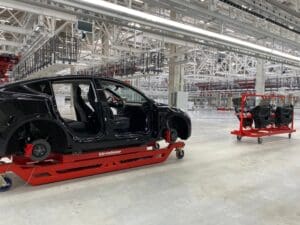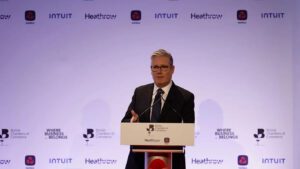Four standout teams have been crowned winners of the Isle of Man Innovation Challenge 2025, following a global competition showcasing cutting-edge solutions in cleantech, data and AI, fintech, and sustainability.
Now in its third year, the Innovation Challenge attracted over 100 entrants from more than 20 countries, with 14 finalists selected to take part in an intensive 12-week programme. During the process, participants received hands-on support from Isle of Man regulators, government agencies, investors and mentors, using the Island as a live testbed to refine and trial their solutions.
Finalists pitched their innovations at a live showcase on 26 June in front of an expert judging panel and more than 200 attendees. The winners were:
Cleantech: Lnk Technologies (UK) – for their carbon emissions reduction platform, CarbonLnk, which helps businesses optimise energy usage and cut emissions and costs.
Data and AI: Early Ideas by IOM (Isle of Man) – whose AI-powered tool Tandem supports early childhood development with expert-guided, personalised parenting resources.
Fintech: Binderr (Malta) – creators of the world’s first professional and financial services marketplace, designed to streamline compliance, onboarding, and risk management.
Biosphere Award: Big Bower (Isle of Man) – recognised for their AI-powered marketplace that connects brands with sustainable manufacturers and promotes greener supply chains.
The Biosphere Award, presented in partnership with the UK National Commission for UNESCO, highlights solutions that best align with the Isle of Man’s unique UNESCO Biosphere status. Finalists were assessed not only on innovation and feasibility, but also on how well they embraced sustainability and community values.
Winners will now benefit from six months of dedicated support from the Isle of Man’s innovation ecosystem, including mentorship, investor connections, regulatory guidance, and international publicity.
Focus turns to health tech in 2026
Looking ahead, the 2026 Innovation Challenge will turn its focus to Health and Social Care, developed in partnership with the Department of Health and Social Care in the Isle of Man. The new theme will target tech-driven solutions that improve patient outcomes, boost service efficiency, and support frontline healthcare professionals.
Lyle Wraxall, Chief Executive of Digital Isle of Man, said: “Health and Social Care is a natural and exciting evolution for the Innovation Challenge. With a proven model of innovation and cross-government collaboration, we have an opportunity to bring real impact to the areas of public life that need it most.”
Applications for the 2026 challenge will open in November 2025 via innovationiom.com, with global tech innovators encouraged to apply.
The Isle of Man Innovation Challenge is delivered by the Department for Enterprise’s executive agencies – Digital Isle of Man, Finance Isle of Man, and Business Isle of Man – as part of a national strategy to accelerate next-generation technology through real-world trials and public-private collaboration.
Read more:
Winners announced at Isle of Man Innovation Challenge 2025










